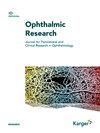Association of the Complement Factor H Y402H Polymorphism and Response to Anti-Vascular Endothelial Growth Factor Treatment in Age-related Macular Degeneration: An Updated Meta-analysis.
IF 2
4区 医学
Q2 OPHTHALMOLOGY
引用次数: 0
Abstract
INTRODUCTION Anti-vascular endothelial growth factor (anti-VEGF) agents have a variable effect on patients with age-related macular degeneration (AMD) that has been attributed to several causes, including genetic factors. We evaluated the effects of Complement Factor H (CFH) rs1061170/Y402H polymorphism on the response to anti-VEGF therapy among AMD patients. METHODS PubMed, Scopus, EMBASE, Web of Science, and Google Scholar were used for a literature search. Pooled odds ratios (ORs) and their 95% confidence intervals (CIs) were estimated to assess the effects of CFH Y402H polymorphism on the response to anti-VEGF therapy in AMD. I2 was used to present the amount of heterogeneity. We used STATA version 14.0 software. RESULTS Twenty-five papers reporting data for 4681 patients were included in this study. Better response to anti-VEGF therapy was seen in T over C (OR=1.25, 95%CI=1.04-1.50), TT over CC (OR=1.60, 95%CI=1.06-2.4), and TT+TC over CC (OR=1.68, 95%CI=1.23-2.28) genotypes. There was no significant difference in three other genetic models (TT vs. TC, TT vs. TC+CC, TC vs. TT+CC). In Asians, no significant difference was observed in all six genetic models. Ranibizumab and bevacizumab had similar efficacy; however, conbercept was more effective in homozygous genotypes. The literature indicated that TT and TC genotypes and T allele were associated with a better functional response, while the CC genotype and C alleles had a better anatomical response. The combination of risk alleles in ARMS2 A69S (rs10490924), VEGF-A (rs699947), and VEGF-A (rs833069) with Y420H is a predictor of non-respondents. CONCLUSION In patients with AMD, the CFH Y402H is a predictor of the response to anti-VEGF agents and should be considered in the treatment plan.补体因子 H Y402H 多态性与老年性黄斑变性患者抗血管内皮生长因子治疗反应的关系:最新的 Meta 分析。
简介:抗血管内皮生长因子(anti-VEGF)药物对老年性黄斑变性(AMD)患者的疗效不一,其原因有多种,包括遗传因素。我们评估了补体因子 H(CFH)rs1061170/Y402H 多态性对 AMD 患者抗血管内皮生长因子治疗反应的影响。评估CFH Y402H多态性对AMD患者抗血管内皮生长因子治疗反应的影响时,估算了汇总的几率比(ORs)及其95%置信区间(CIs)。I2用于显示异质性的程度。我们使用了 STATA 14.0 版软件。结果本研究纳入了 25 篇报告 4681 例患者数据的论文。T基因型比C基因型(OR=1.25,95%CI=1.04-1.50)、TT基因型比CC基因型(OR=1.60,95%CI=1.06-2.4)和TT+TC基因型比CC基因型(OR=1.68,95%CI=1.23-2.28)对抗病毒治疗的反应更好。其他三种基因型(TT vs. TC、TT vs. TC+CC、TC vs. TT+CC)没有明显差异。在亚洲人中,所有六个基因模型均未观察到明显差异。雷珠单抗和贝伐单抗的疗效相似,但康柏西汀对同基因型患者更有效。文献表明,TT、TC 基因型和 T 等位基因与更好的功能反应相关,而 CC 基因型和 C 等位基因与更好的解剖反应相关。ARMS2的A69S(rs10490924)、VEGF-A(rs699947)和VEGF-A(rs833069)中的风险等位基因与Y420H的组合是无应答的预测因子。结论在AMD患者中,CFH Y402H是抗VEGF药物反应的预测因子,应在治疗计划中予以考虑。
本文章由计算机程序翻译,如有差异,请以英文原文为准。
求助全文
约1分钟内获得全文
求助全文
来源期刊

Ophthalmic Research
医学-眼科学
CiteScore
3.80
自引率
4.80%
发文量
75
审稿时长
6-12 weeks
期刊介绍:
''Ophthalmic Research'' features original papers and reviews reporting on translational and clinical studies. Authors from throughout the world cover research topics on every field in connection with physical, physiologic, pharmacological, biochemical and molecular biological aspects of ophthalmology. This journal also aims to provide a record of international clinical research for both researchers and clinicians in ophthalmology. Finally, the transfer of information from fundamental research to clinical research and clinical practice is particularly welcome.
 求助内容:
求助内容: 应助结果提醒方式:
应助结果提醒方式:


